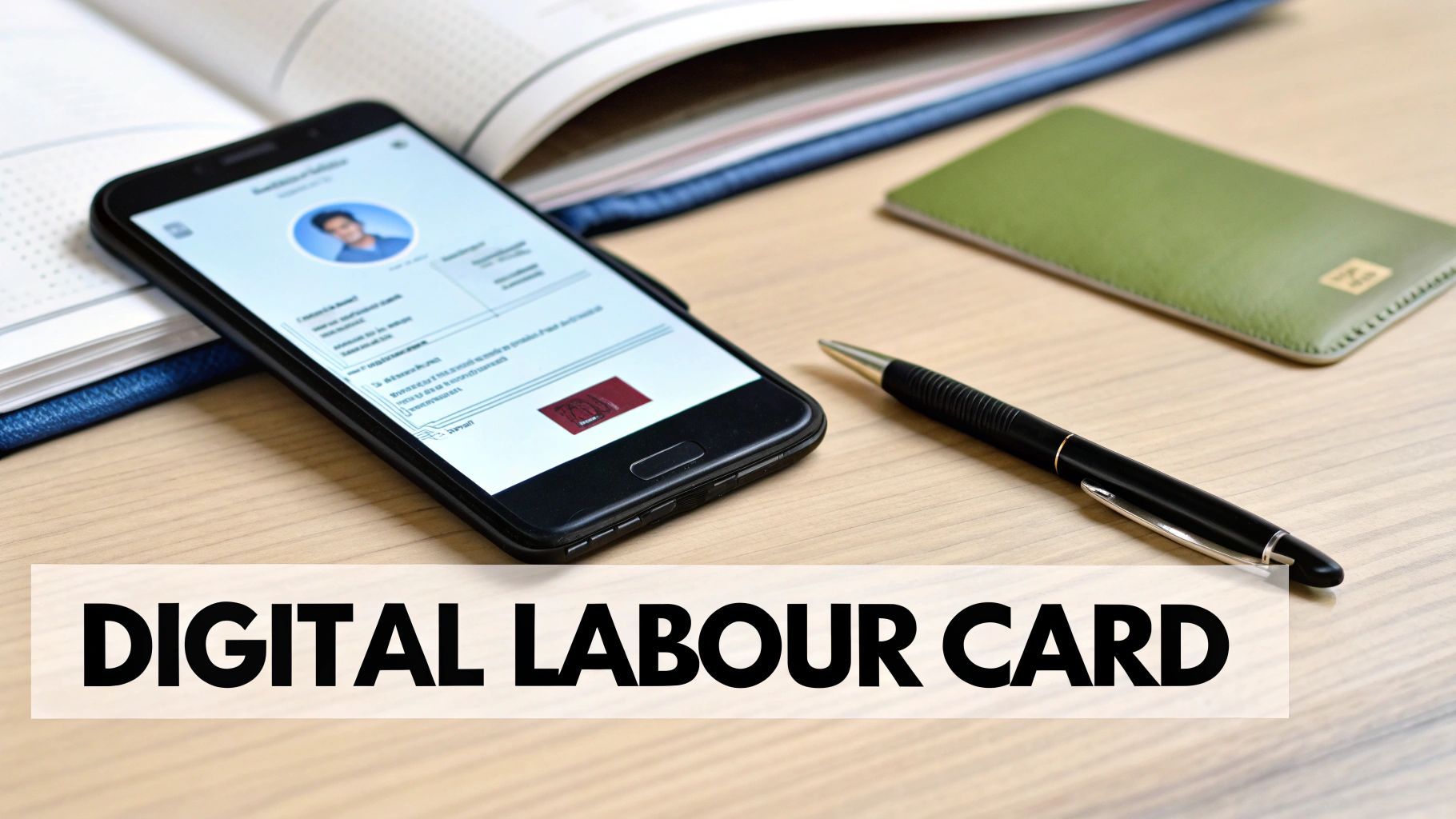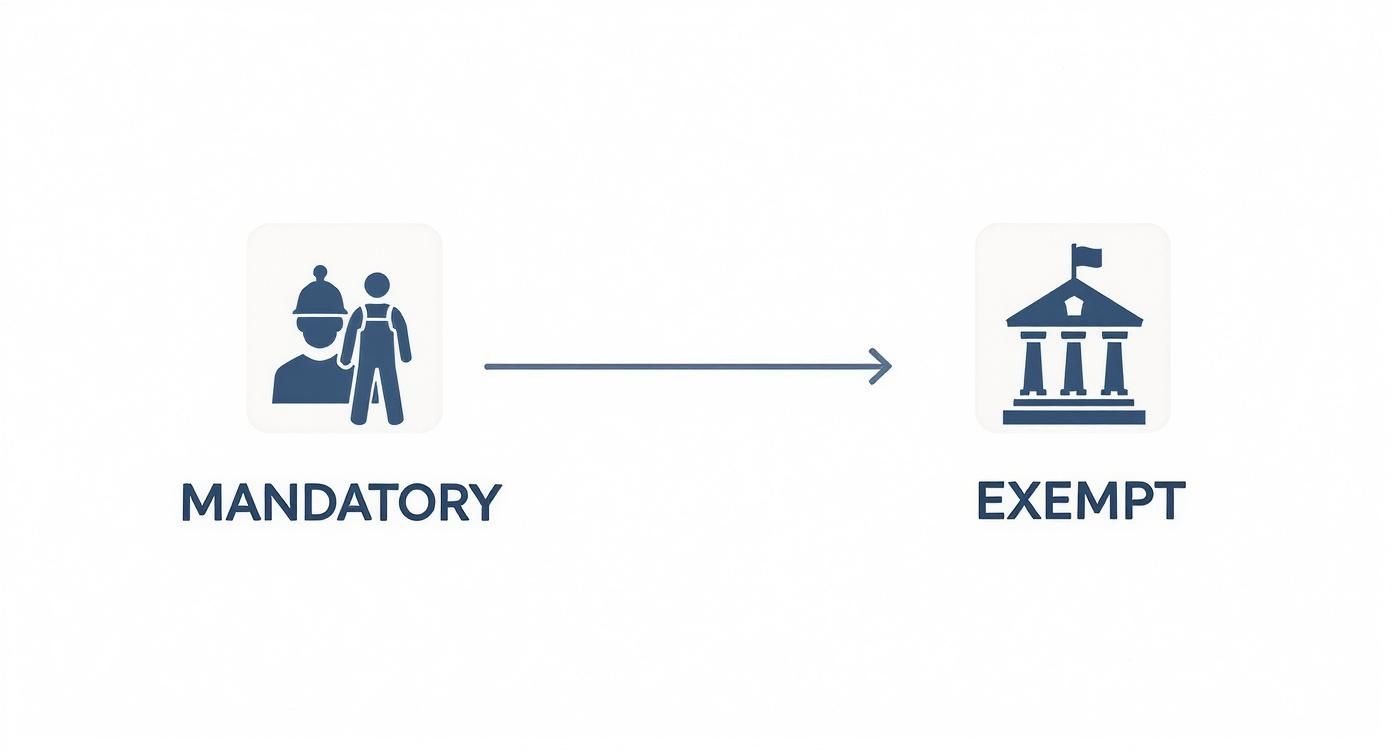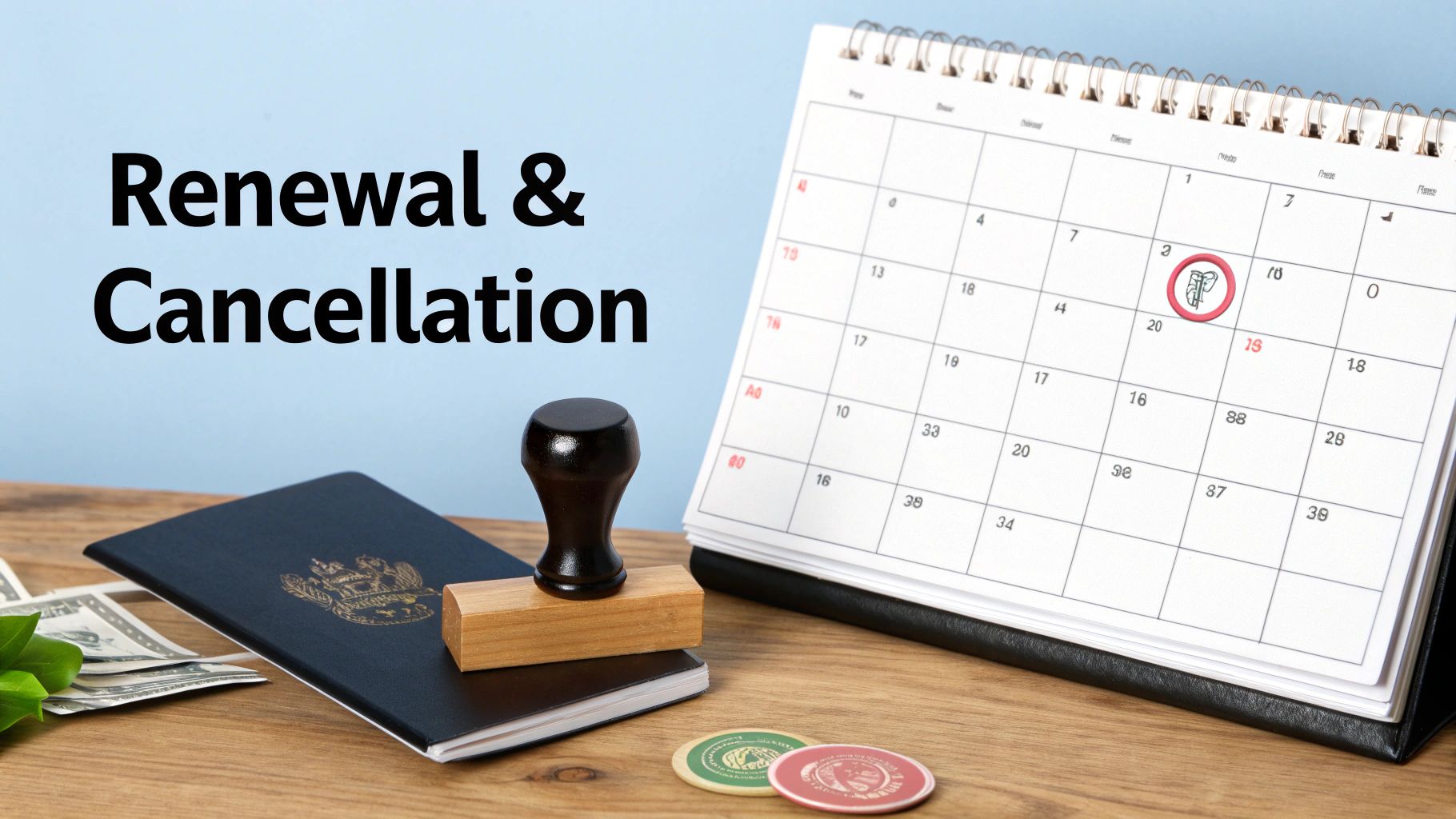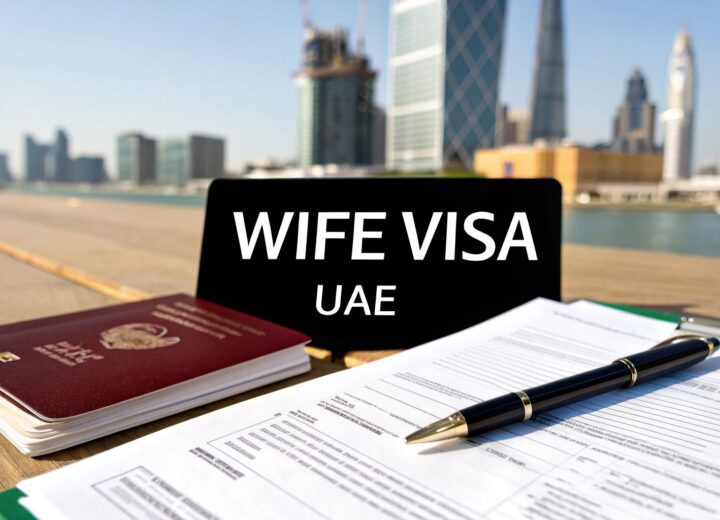If you're planning to work in the UAE, you'll quickly hear about something called a labour card. What is it, exactly? Think of it as the official green light for your employment – a legal handshake between you, your employer, and the UAE government.
This crucial document is managed by the Ministry of Human Resources and Emiratisation (MoHRE) and is a must-have for any expat working in a private company on the UAE mainland.
What Exactly Is the UAE Labour Card?
Getting your head around the paperwork for working in the UAE can feel a bit overwhelming, but the labour card is one of the most fundamental pieces of the puzzle. For years, it was an actual physical card you'd carry in your wallet. Today, it’s gone completely digital and lives on the MoHRE app, which makes checking and managing it a whole lot easier for everyone.
At its heart, the labour card has one simple but vital job: it legally confirms that you're authorised to work for a specific company in the UAE. It’s the official record proving you have a valid employment contract and the right sponsorship. This document is the foundation of your professional life here, giving both you and your employer a clear and secure legal standing. Working without one is illegal and brings serious trouble for both the employee and the business.
Why Is This Document So Important?
The labour card isn't just about ticking a legal box; its importance trickles down into almost every part of your life in the UAE. Your ability to get or renew your residence visa, for instance, is directly linked to the status of your work permit.
It’s also the key that unlocks many other essential services. You’ll find you need it for things like:
- Opening a personal bank account
- Signing a tenancy contract to rent an apartment
- Accessing certain government and healthcare services
- Making sure your rights are protected under the UAE Labour Law
Here's a look at what the digital labour card details look like within the MoHRE app.

As you can see, key information like your name, profession, nationality, and the card's issue and expiry dates are all right there. It’s basically your digital employment ID.
To give you a quick overview, here are the key facts about the UAE labour card in one place.
UAE Labour Card at a Glance
| Attribute | Details |
|---|---|
| Official Name | Work Permit / Labour Card |
| Issuing Authority | Ministry of Human Resources and Emiratisation (MoHRE) |
| Format | Fully digital, accessible via the MoHRE app |
| Who Needs It? | All expatriate employees aged 18 to 60 in the mainland private sector |
| Primary Purpose | To legally authorise employment with a specific sponsor |
| Validity | Typically 2 years, aligned with the employment contract |
| Key Function | Links your employment contract to your residence visa |
Ultimately, any expat worker between 18 and 60 years old working in the UAE's private sector must have a valid labour card. To dig deeper into the laws that govern it, Zimyo's guide on the UAE work permit provides more legal context.
Who Needs a Labour Card and Who Doesn't?
Figuring out who needs a UAE labour card is actually pretty simple. If you're an expatriate working for a private company on the UAE mainland, consider this document non-negotiable. It's your official green light to work, and a core part of staying compliant with UAE Labour Law.
This rule covers the huge majority of foreign workers in the country. Any expat between the ages of 18 and 60 who's employed by a mainland business falls right into this bucket. Your employer is on the hook to get this digital work permit sorted for you, usually within 60 days of you starting the job.
But, it's not a one-size-fits-all requirement. Not everyone living and working in the UAE needs a labour card. The rules draw a clear line in the sand, separating those who must have one from specific groups who are exempt. Getting this distinction right is crucial for both employees and companies.
The Main Groups Exempt from Needing a Labour Card
Several groups of people work under different legal umbrellas, so they aren't required to get a labour card from the Ministry of Human Resources and Emiratisation (MoHRE).
The biggest exempt groups are:
- UAE and GCC Nationals: Citizens from the United Arab Emirates and other Gulf Cooperation Council countries don't need a labour card to work in the private sector.
- Public Sector Employees: If you work for a federal or local government department, public institution, or another authority, you follow a different set of administrative rules and won't need a MoHRE labour card.
- Free Zone Employees: People working for companies inside one of the UAE's many free zones fall under that specific free zone's authority. Instead of a mainland labour card, they get a work permit or ID card issued directly by their free zone.
- Domestic Workers: Nannies, drivers, maids, and other domestic staff are covered by separate laws, so the standard labour card system doesn't apply to them.
It's important to remember that being exempt from a MoHRE labour card doesn't mean you can work without any paperwork. It just means your employment is managed by a different authority, like a specific free zone or government body.
Other Notable Exemptions
Beyond those main categories, a few other situations will place you outside the labour card requirement. Business owners and investors with an investor or partner visa, for instance, aren't classified as employees and are therefore exempt.
Likewise, dependents such as a spouse or child on a family visa don't need a labour card—unless they decide to get a job. If a sponsored dependent wants to start working, they'll need a specific permit to do so. For anyone changing jobs or their employment status, knowing the rules around getting the right permissions is vital; you can learn more in our guide on what is an NOC in the UAE. This kind of clarity helps everyone—individuals and businesses alike—navigate the employment landscape without any compliance hiccups.
Navigating the Labour Card Application Process
So, your employer is the one who handles all the paperwork for your labour card, but it really helps to know how the whole thing works. Think of it as a roadmap for your first few weeks on the job. Understanding the steps gives you a clear picture of what’s happening behind the scenes and helps you get everything ready for a smooth start.
The process officially kicks off the moment you sign your job offer. Your employer will then issue an official employment contract through the Ministry of Human Resources and Emiratisation (MoHRE). This is a digital document that spells out your role, salary, and all the terms of your job. Once you add your electronic signature, it’s legally binding.
Key Stages and Required Documents
After the contract is signed, your employer or their PRO gets to work. They’ll submit the work permit application through a government portal like Tas'heel. This is where having an expert on your side really pays off, as they make sure every detail is correct from the get-go.
From there, a few things need to happen at the same time, and this is where you’ll be directly involved:
- Medical Fitness Test: You’ll need to visit a government-approved health centre for a medical check-up. This is a standard screening for certain communicable diseases and is a must-have for getting your residence visa.
- Emirates ID Application: While the medical is in progress, you also have to apply for your Emirates ID. This little card is your official proof of identity for pretty much everything in the UAE. If you want to dive deeper into this, check out our guide on the Emirates ID application process.
- Residence Visa Stamping: Once you’ve passed the medical test and given your biometrics for the Emirates ID, your passport is sent off to get the residence visa stamped inside.
The final step—getting your digital work permit (your labour card)—is tied directly to that visa stamp. The whole system is designed to work in sync, making sure you’re fully compliant with both residency and employment laws.
Your Role in the Process
Even though your employer is driving the process, you have a crucial part to play: providing your personal documents quickly. Any hold-ups on your end can slow everything down.
Here’s what you’ll typically need to hand over:
- A recent, clear passport-sized photo with a white background.
- A copy of your passport (make sure it has at least six months of validity left).
- Attested copies of your university degrees or professional certificates, depending on what your job requires.
Your employer will take care of their own documents, like their company’s trade licence and establishment card, to round out the application.
This infographic breaks down exactly who needs a labour card and who doesn't.

As you can see, it’s a straightforward rule: expatriate workers in the private sector must have one, while government employees operate under a different framework. By knowing how these pieces fit together, you can be an active partner in securing your legal status to work in the UAE.
Understanding Different Types of UAE Work Permits
While the standard two-year work permit is the one most people know, the UAE’s employment framework is actually far more flexible than you might think. The system is designed with a variety of permits to meet the demands of a modern, fast-paced economy.
For businesses looking to bring in specialised talent, or for individuals wanting something other than a traditional 9-to-5, understanding these options is absolutely key.
The UAE’s labour card system isn’t a one-size-fits-all model. It offers different permit types tailored to specific work situations, which brings both flexibility and legal clarity to the table. The main one, of course, is the Standard Work Permit, which is issued to most full-time foreign employees in the private sector and is valid for two years.
But there's more. The system also includes specialised permits like the Temporary Employment Permit for project-based work that lasts up to six months, and the Employment Transfer Permit, which helps employees switch jobs within the country. You can get a deeper look at the different permit types for UAE labour cards on Accel HR Consulting.
This variety is a clear sign that whether a company needs an expert for a short-term gig or a professional wants to work part-time, there's a legal path to make it happen.
Permits for Flexible and Short-Term Work
Let's face it, not every job fits neatly into a two-year contract. For specific, project-based roles, the Temporary Work Permit is the perfect solution.
Think of companies hiring consultants or specialists for assignments that last up to six months. This permit lets them bring in top talent for a fixed period without the commitment of a full-blown, long-term contract.
Another option that's getting more and more popular is the Part-Time Work Permit. This is a game-changer because it allows someone to work for more than one employer at the same time, as long as their total hours don't go over the legal limit. It's ideal for students, working parents, or skilled professionals who want to share their expertise with multiple companies instead of being tied to a single full-time role.
These specialised permits are a clear signal that the UAE's labour market is adapting to global work trends. They provide the legal structure for the gig economy and flexible talent acquisition, which is crucial for innovation.
Specialised Permits for Unique Situations
The system also has solutions for more unique employment situations, making sure everyone works within a legal and protected framework.
Take the Juvenile Work Permit, for example. This allows young professionals between 15 and 18 years old to get valuable work experience. It comes with very strict rules about working hours and conditions to protect the young person's well-being, making it perfect for internships and apprenticeships.
Then there are individuals who live in the UAE under a family member's sponsorship. The Permit for Citizens Sponsored by Relatives lets them take up a job without having to change their visa status. This really simplifies the hiring process for employers and gives sponsored dependents a great opportunity to join the workforce.
Ultimately, understanding what a labour card is in the UAE means recognising all these different forms and how they fit into the bigger picture.
How to Handle Labour Card Renewal and Cancellation
Staying on the right side of UAE labour law isn’t a one-and-done deal; it's an ongoing process. When it comes to your digital work permit, there are two key moments every employee and employer needs to get right: renewal and cancellation. Getting these procedures spot-on is essential for keeping your legal status secure and ensuring your employment journey in the UAE is smooth.

Your employer has a legal duty to renew your labour card before it expires. The window for this is usually within 50 days of the expiry date. Dropping the ball on this is a serious compliance issue and comes with hefty penalties. Fines for late renewals can pile up daily, turning into a major financial headache for the company. It’s a perfect example of why being proactive is so important.
The Labour Card Cancellation Process
Just as important as getting the renewal right is handling the cancellation correctly. When your time with a company ends, whether you resign or your contract is terminated, your labour card must be officially cancelled. This is a mandatory final step that formally closes your employment file with that company and the Ministry of Human Resources and Emiratisation (MoHRE).
Proper cancellation is a must for a few big reasons:
- For you, the employee: It gives you a clean slate, confirming there are no lingering legal ties to your old job.
- For the employer: It officially ends their responsibility for you as an employee.
- For your next job: You simply cannot get a new work permit with a new employer until the old one is properly cancelled.
Think of it like officially closing an account. Without this formal step, the system still registers you as being legally tied to your previous employer. This can create massive headaches for your next career move or if you’re planning to leave the UAE.
Why Professional Handling Matters
Navigating the ins and outs of renewal and cancellation demands a sharp eye for detail and a solid grasp of MoHRE’s rules. A simple mistake or a slight delay can snowball into fines, legal trouble, and disruption for everyone involved. This is precisely why many businesses hand these critical tasks over to specialists in Corporate PRO Services and Attestation Services.
These experts make sure every piece of paper is filed correctly and on schedule. This protects the company from penalties and gives employees the confidence that everything is being handled by the book. For a closer look at the steps, our guide on the visa cancellation procedure in UAE is a great resource, as the two processes are closely linked. Understanding both sides—renewal and cancellation—is fundamental to knowing what a UAE labour card is and how it works throughout your employment.
Why the Labour Card Is Your Key to Working in the UAE
Think of the labour card as more than just a bit of admin. It's the core of the UAE's system for protecting its workforce. This digital document is your official proof of employment, guaranteeing your rights under UAE law. It’s what ensures everything runs smoothly, from getting paid on time through the Wage Protection System (WPS) to having your end-of-service benefits calculated correctly.
This system is essential for the UAE government to manage its huge and diverse expatriate workforce. As of early 2025, the country's workforce hit a new high of 9.4 million people. Around 85% of them are in the private sector, and almost all require a valid MoHRE work permit. That just shows you the sheer scale of the system. You can read more about the UAE's record-breaking job market to get a feel for the economic backdrop.
The Bigger Picture: Economic Stability and Growth
At its heart, the labour card system allows the UAE to balance incredible economic growth with a stable, organised environment for global talent. It provides the legal clarity and structure needed to attract skilled professionals from all over the world and keep them here.
When you understand what a labour card is in the UAE, you start to see the framework that makes the country's ambitious economic vision possible. It’s a system built on transparency and regulation.
For any business, getting to grips with these local rules is non-negotiable, especially if you're about to hire your first team member. It’s the foundation for running a compliant and successful operation in the Emirates. It’s also a good idea to review the general considerations when hiring your first employee for a broader perspective. Ultimately, getting professional guidance to navigate this process is a smart move, making sure you and your team stay compliant, protected, and ready for growth.
Frequently Asked Questions
When you're sorting out employment in a new country, a few questions are bound to pop up. Let's clear up some of the most common ones about the UAE labour card and what it means for you.
How Can I Check My UAE Labour Card Status Online?
Checking your labour card status is pretty straightforward. You can do it right from your phone or computer through the official Ministry of Human Resources and Emiratisation (MoHRE) website or their mobile app.
All you'll need is some basic information, like your passport number or the transaction number from your application. Once you log in, just head to the enquiry services to see all your work permit details. It's a quick and easy way for both you and your employer to confirm everything is valid and up-to-date.
What Is the Difference Between a Labour Card and an Emirates ID?
This is a common point of confusion, but the two documents have very different jobs. Think of your labour card (or work permit) as your permission slip to work. It's issued by MoHRE and specifically ties you to your employer, making your job legal.
Your Emirates ID, on the other hand, is your all-purpose identification card for life in the UAE. Issued by the Federal Authority for Identity, Citizenship, Customs & Port Security (ICP), it’s what you'll use for everything from opening a bank account to visiting a doctor. One is purely for your job; the other is for everything else.
What Happens if I Lose My Job?
If your employment contract comes to an end, your employer has a legal duty to begin the cancellation process for both your labour card and your residence visa. This isn't something they can skip.
Once everything is officially cancelled, a grace period kicks in—it's often 30 days, but this can vary. During this window, you have a couple of options: find a new job and have your new company start the sponsorship transfer, or make arrangements to leave the country. You can't get a new work permit until the old one has been properly cancelled.
Navigating the complexities of work permits, visas, and company setup can feel overwhelming, but that's exactly where we come in. The experts at PRO Deskk are here to help you stay compliant and focus on your growth.
✅ Specialists in Mainland Company Formation in Dubai, Sharjah & Abu Dhabi
✅ Specialists in Freezone Company Formation across the UAE
✅ Specialists in Golden Visa on Property and Investor Visa
✅ Specialists in Corporate PRO Services and Attestation Services
✅ 24/7 Support Service – Always here when you need us
✅ Cost-Effective Business Setup Solutions tailored to your needs
✅ Enjoy UAE Tax Benefits for International Entrepreneurs
📞 Call Us Now: +971-54-4710034
💬 WhatsApp Us Today for a Free Consultation





